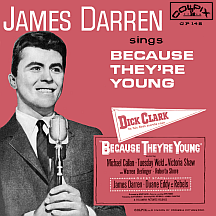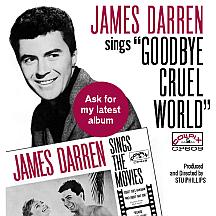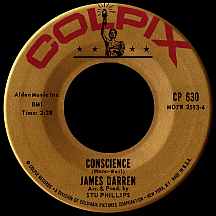JAMES DARREN
"Goodbye Cruel World," he sang, 'I'm off to join the circus...' or was that '...the army'? Neither, as it turns out. James Darren chose to follow a career in show business, a line of work that, come to think of it, can sometimes resemble a three-ring spectacle or a battle zone. His main ambition was to be an actor, though singing became just as important when he realized, motivated by others who recognized his talent, that he was pretty good at it. "Jimmy" was successful at both, off and mostly on, for more than four decades.
South Philadelphian James Ercolani went through a phase as a troublemaker, getting kicked out of a few schools before cleaning up his act and avoiding any serious detention time. Like many teenagers, he was obsessed with sports cars; the idea for his professional name came from the 1954 Kaiser Darrin convertible roadster (originally designed by Los Angeles auto dealer Howard "Dutch" Darrin and manufactured by Henry J. Kaiser), changing the "i" on an "e." Moving to New York in his late teens, he studied with acting teach Stella Adler (who'd famously mentored Marlon Brando and many others). He had professional photos made by Seymour Zelman at the Maurice Seymour studio after which, in the summer of 1956, casting agent Joyce Selznick (David O.'s niece) convinced Harry Cohn of Columbia Pictures to sign him to a contract.
Within a few months, the 20-year-old was top-billed in the crime drama Rumble on the Docks. Supporting roles followed in 1957, in Army comedy Operation Mad Ball starring Jack Lemmon, two low-budget crime films, The Brothers Rico and The Tijuana Story, a western, Gunman's Walk, and an episode of a short-lived crime series, The Web (titled Kill and Run). While a "young criminal" stereotype may have been developing, there was little reason for concern; he was soon to become typecast in a different, star-making way...as a teen idol.
In 1958, the Columbia studio started its Colpix record label, giving him the name Jimmy Darren for record releases. As letters from female fans were delivered to Columbia's offices by the bagful, the more youthful moniker came as an experiment to market him to that younger demographic while keeping him legitimate with older viewers under his formal first name. The A side of his late '58 debut single, "Mighty Pretty Territory," was inspired by, but not featured in, the recently-premiered ABC series The Naked City, produced by Columbia's Screen Gems TV division (Darren had three other songs on the show's soundtrack album). The B side, "There's No Such Thing," predated the theatrical release of the film that would elevate his star power several notches. He sang the song (credited as "The Next Best Thing to Love") to Mary Stone (played by Shelley Fabares) on the 1959 April Fool episode of The Donna Reed Show, though it made little impact.
Five days later he appeared on the live broadcast of The Academy Awards, performing Jay Livingston and Ray Evans' nominated song "Almost in Your Arms" (from Houseboat, starring Cary Grant, Sophia Loren and Reed Show child actor Paul Petersen), sharing the Oscar stage with Anna Maria Alberghetti, Connie Stevens, Tuesday Weld, Nick Adams and Dean Jones (all in place of Sam Cooke, whose version was used in the film). His media hat trick concluded with the April 10 theatrical release of Gidget ("The Story of the Beach Generation"), a star-making vehicle for Sandra Dee, its trailer enticing viewers to "Find out why all the boys fidget over Gidget the way slightly older men fidget over Bridget (Bardot)!"
To a lesser degree, the movie also served as a breakthrough for onscreen-billed James in his role of "Moondoggie." He sang "The Next Best Thing to Love" to Sandra, just as he had to Shelley days earlier. Two versions of the "Gidget" title theme (composed by Fred Karger and Patti Washington, who happened to be award-winning composer Ned Washington's wife) were in the film; The Four Preps sang it over the credits and Moondoggie took his turn with the lyrics ('Strictly from Dixie, face like a pixie, shorter than girls should be...') as the story progressed. A Colpix studio version by Darren (credited as Jimmy) made the middle regions of the national charts, his first hit in just two tries.
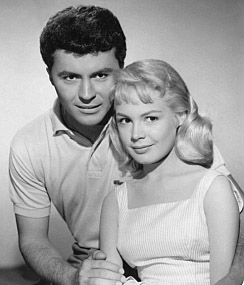
Another mid-charter came that summer with "Angel Face," a tune Doc Pomus and Mort Shuman wrote for Darren's soon-to-be wife-for-life Evy Norlund, who'd been crowned Miss Denmark the previous year. Some considerable time was to pass before "Jimmy" would have another hit single; "I Ain't Sharin' Sharon," "Teenage Tears" and "You Are My Dream" were interspersed with a role in The Gene Krupa Story and an episode of CBS-TV drama The Lineup. His vocal theme for Because They're Young (starring Dick Clark in his first of a handful of films where he didn't play himself) didn't catch on as hoped, overshadowed by Duane Eddy's smash instrumental version. "James" starred in All the Young Men (he sang the theme) and Let No Man Write My Epitaph and had a sizeable part in the Oscar-winning blockbuster The Guns of Navarone (1961's top-grossing film), while "Jimmy" landed one dud after another, racking up a two-year no-hit stretch.
Gidget Goes Hawaiian premiered in June 1961 with James cast opposite Deborah Walley (Sandra, who'd signed a contract with another studio, was unavailable); a single recording of the title theme (once again, he was James onscreen and Jimmy on record) put his losing streak into double digits while the film made a profit and set him up for another sequel. That summer he was given a song by up-and-coming songwriter Gloria Shayne, whose voice was speeded up to sound like a circus calliope on a demo by singer Tony Orlando; Darren's studio version of "Goodbye Cruel World" ('...I'm off to join the circus'), produced by Stu Phillips, also featured Gloria's "tootin'" effect. Not pleased with the finished take, he nevertheless performed a shorter, lyrically-adjusted version ('I'm off to join the army' and 'broken-hearted guy' instead of 'clown'), with a real calliope in place of Shayne's taped trickery, in the fourth season premiere of The Donna Reed Show. For the second time he played a pop singer (in 1959 his character had been "Buzz Berry," this time it was "Kip Dennis") and on both installments Mary (Shelley, never to be confused with the author of Frankenstein) had a crush on him. Radio jumped on the record; it raced to the top of many stations' playlists around the country in November, rising the following month to number three on Billboard and number two on Cash Box.
So whether he liked it or not, 25-year-old James was a teen idol in film and music, in some ways like two different guys. Gerry Goffin and Carole King came up with his next hit, "Her Royal Majesty" ('...she's the queen that broke my heart'), top ten in March 1962. Barry Mann and Cynthia Weil supplied two in a row: almost-top ten hit "Conscience" (with one final nod to that other name as the ethical voice in his head sang 'Now listen, Jimmy...') and the top 40-ranked "Mary's Little Lamb" ('...she leads me by the nose'...did Mary/Shelley inspire this?). Darren went against the grain with a role in Hawaiian scandal drama Diamond Head while Colpix drove another nail into his teen idol-hesitant heart with the album Teenage Triangle, featuring four songs each by Darren and the much-younger Reed Show stars Fabares and Paul "Jeff" Petersen. Bonus for buyers: it's a hit-loaded compilation!
Colpix had a good thing going, for the time being, at least. Shayne and Howard Greenfield penned the summer '62 charter "Hail to the Conquering Hero" and Don Costa took the place of regular producer Phillips for early '63's "Pin a Medal on Joey"('...he stole your love from me!'). Each catchy, well-produced ditty was another painful stab at Darren's grownup forehead. Yet the contracts were well-worded: he had no choice. Gidget Goes to Rome hit theaters with James reprising his Moondoggie character and little-known actress Cindy Carol in the title role, after which Darren bowed out. But the franchise kept going: two years later, newcomer (and future two-time Oscar winner) Sally Field appeared on home screens in 32 consecutive weekly episodes of the Gidget sitcom. Then Karen Valentine reprised the role in a 1969 TV movie, Gidget Grows Up (with Petersen as Moondoggie!)...and there were still more Gidget flicks to come.
Darren did double duty, acting in and singing the title themes for Under the Yum Yum Tree, For Those Who Think Young and The Lively Set. A second Oscar show appearance had him performing the nominated song "It's a Mad Mad Mad Mad World" (composed by Ernest Gold and Mack David). He followed this with two voice assignments on animated Hanna-Barbera shows, supplying Yogi Bear's singing voice in Hey There, it's Yogi Bear (sidekick Boo-Boo: "Gosh, you sing just like James Darren!") and a Flintstones episode as "Jimmy Darrock." He also left Colpix and signed with Warner Bros. Records.
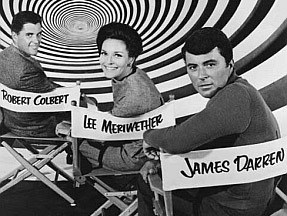
A March 1966 appearance on ABC-TV's Voyage to the Bottom of the Sea (titled The Mechanical Man) made producer Irwin Allen take notice; he was looking for a lead for a new primetime science fiction series and Darren filled the bill. The Time Tunnel, which took him (and costar Robert Colbert) into historic eras and locations (with a few weird futuristic scenarios thrown in for fun) ran from September '66 until April '67; the series won an Emmy for Photographic Special Effects. Shortly after the show's debut, his sixth WB single, "All," an adult-pop song at odds with his youthful Colpix output, became his only top 40 hit for the label.
Keeping a steady if inconsistent presence over the next three decades, he made occasional films (Venus in Furs with Barbara McNair in 1969, Allen's City Beneath the Sea, dog story Mooch and political thriller The Lives of Jenny Dolan between 1971 and '75) while recording for Buddah, MGM and Kirshner; in the fall of '71, "Mammy Blue" made a brief impact on the latter label, the closest he came to having a hit single over a decade-long stretch (N.Y. band Stories scored with their version two years later). There were numerous nightclub stints (including regular engagements at the Sahara in Las Vegas) and many guest shots on popular TV series, mostly of the cops-and-crime variety (S.W.A.T., Police Woman, Charlie's Angels, Police Story, Hawaii Five-O, Vega$) and lighter fare (Love American Style, The Love Boat and Fantasy Island).
In 1977 he hopped on Sylvester Stallone's ringside Rocky bandwagon, enjoying a nice run on the charts with a disco cover of "You Take My Heart Away" from the top-grossing, Oscar-winning film. Two notable television dramas kept an intermittent spotlight on the age-defying James Darren: cop show T.J. Hooker between 1982 and '86 and several episodes of Star Trek: Deep Space Nine in the late '90s, returning him to the gimmick of portraying a fictional singer (Vic Fontaine in this case) performing pop standards, a peculiar retro element of the celebrated sci-fi franchise.
NOTABLE SINGLES:
- Mighty Pretty Territory - 1958
as Jimmy Darren / - There's No Such Thing - 1958
as Jimmy Darren - Gidget - 1959
as Jimmy Darren - Angel Face - 1959
as Jimmy Darren - I Ain't Sharin' Sharon - 1959
as Jimmy Darren - Teenage Tears - 1959
as Jimmy Darren - You Are My Dream - 1960
as Jimmy Darren - Because They're Young - 1960
- Traveling Down a Lonely Road - 1960
as Jimmy Darren - All the Young Men - 1960
as Jimmy Darren - Gotta Have Love - 1961
as Jimmy Darren - Gidget Goes Hawaiian - 1961
as Jimmy Darren - Goodbye Cruel World - 1961
- Her Royal Majesty - 1962
- Conscience - 1962
- Mary's Little Lamb - 1962
- Hail to the Conquering Hero - 1962
- Pin a Medal on Joey - 1963
- They Should Have Given You the Oscar - 1963
- Gegetta - 1963
- Back Stage - 1963
- Punch and Judy - 1964
- Because You're Mine - 1965
- Where Did We Go Wrong - 1966
- Crazy Me - 1966
- All - 1966
- Since I Don't Have You - 1967
- Didn't We - 1967
- Wheeling, West Virginia - 1970
- Bring Me Down Slow - 1971
- Mammy Blue - 1971
- You Take My Heart Away - 1977


